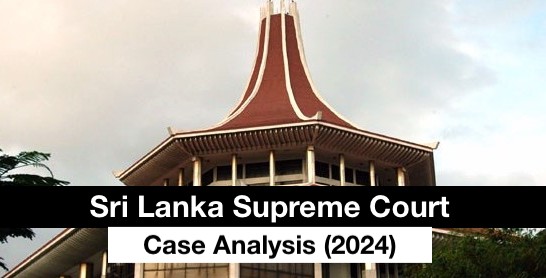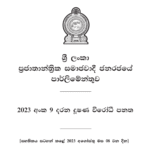The Supreme Court’s decision resolves a long-standing property dispute, reaffirming the importance of judicial efficiency and fairness in execution proceedings. By prioritizing substantive justice over procedural technicalities, the Court upheld the plaintiff’s rights and highlighted the judiciary’s role in correcting errors and ensuring justice. This case serves as a precedent for interpreting Section 337 and managing execution-related disputes.
SC Appeal No. 151/2014
Case Overview
This case involves a dispute over the execution of a decree for the possession of property initially filed in 1993. The appeal concerns the interpretation and application of Section 337 of the Civil Procedure Code, procedural matters related to the appeal, and the Supreme Court’s role in correcting injustices caused by lower courts.
Key Facts
- Parties Involved:
- Plaintiff (Appellant-Respondent): Ganendralingam Sri Vidyadevi, represented by her attorney.
- Defendant (Respondent-Appellant): S. Tharmathasan, succeeded by his wife and children (Substituted Defendants) after his death in 2005.
- Initial Case:
- The plaintiff sought to eject the defendant from premises in Trincomalee and recover damages for unlawful occupation.
- A settlement in 1993 allowed the defendant to occupy the premises until May 1996, subject to conditions.
- Non-Compliance:
- The defendant failed to vacate the premises entirely, leading to a series of legal proceedings to enforce the decree.
- Long-Standing Litigation:
- The case saw multiple appeals, including a 1999 Court of Appeal decision and further proceedings in the District Court and High Court.
Legal Issues
- Time-Bar Under Section 337(1):
- Whether the plaintiff’s 2008 application for a writ of execution was barred by the 10-year limitation under Section 337(1) of the Civil Procedure Code.
- Nature of the District Court Order:
- Whether the District Court’s 2009 order refusing the writ of execution was a “final judgment” or an “interlocutory order,” impacting the appeal process.
- Injustice to the Plaintiff:
- Whether the judicial delays and procedural errors deprived the plaintiff of her rightful claim to the property.
Supreme Court’s Findings
1. Time-Bar Issue (Section 337(1))
- High Court’s Ruling:
- The High Court extended the 10-year limitation by excluding the period during which the Court of Appeal’s interim order (1997–1999) prevented execution of the decree.
- It deemed the 2008 application within time.
- Supreme Court’s Decision:
- Agreed with the High Court’s liberal interpretation but held that the operative date for the 10-year limitation remained May 1996.
- Excluding the 27 months of delay caused by the interim order, the plaintiff’s 2008 application was timely.
2. Nature of the District Court Order
- Supreme Court’s Interpretation:
- The 2009 District Court order was not a “final judgment” but an interlocutory order.
- The plaintiff should have filed a leave-to-appeal application rather than a notice of appeal.
3. Remedying Injustice
- The Supreme Court emphasized its constitutional role in correcting injustices, directing the District Court to issue the writ of execution.
- It highlighted that the plaintiff was unjustly deprived of her property for over 28 years due to procedural delays and defendant’s tactics.
Significance of the Judgment
- Liberal Interpretation of Procedural Law:
- The Supreme Court adopted a substance-over-form approach, favoring the enforcement of decrees over procedural technicalities.
- Protection of Judgment-Creditors:
- The ruling underscores the judiciary’s responsibility to ensure that judgment-creditors can realize their legal victories, particularly in execution proceedings.
- Judicial Accountability:
- The judgment criticized delays and lapses at various judicial levels, advocating for timely and effective dispute resolution.
- Cost Orders:
- The plaintiff was awarded costs in all proceedings, including a significant sum for Supreme Court litigation.
Download Full Judgement














